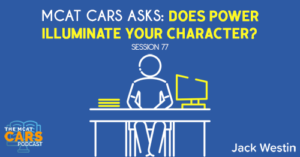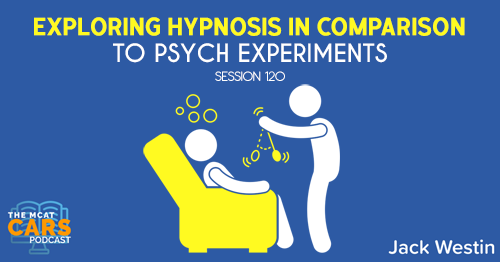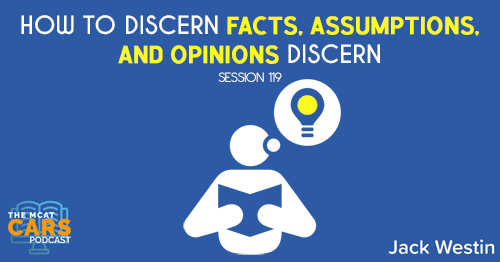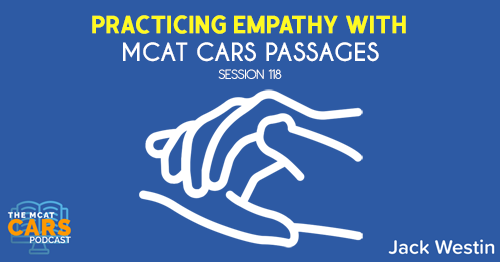Apple Podcasts | Google Podcasts

Session 77
Easy CARS passages are often accompanied by tough questions. We’ll show you how to interpret the author’s message and what types of questions you might expect. Today’s article is an interesting take on leadership.
As always, we’re joined by Jack of Jack Westin.com. Get free daily CARS passages right to your email inbox from Jack Westin.
Listen to this podcast episode with the player above, or keep reading for the highlights and takeaway points.
Link to article:
http://nautil.us/issue/46/balance/why-power-brings-out-your-true-self
At the 2012 Democratic National Convention, Michelle Obama told the crowd, “Being president doesn’t change who you are. It reveals who you are.”
Growing up, Michelle said, she and Barack learned important lessons from their families about “dignity and decency” and “gratitude and humility.” “At the end of the day,” she said, “when it comes time to make that decision, as president, all you have to guide you are your values, and your vision, and the life experiences that make you who you are.”
Research in cognitive science reveals the former First Lady is right: Power exposes your true character. It releases inhibitions and sets your inner self free. If you’re a jerk when you gain power, you’ll become more of one. If you’re a mensch, you’ll get nicer. So if you happen to all of a sudden become president, or at least president of your lab or book club, what inner self will come out?
Psychologists generally define power as control over others, by providing or withholding resources, without social interference. Tapping your true nature, though, begins with feeling powerful. Getting the corner office boosts creativity and reduces conformity.
In a 2008 experiment, undergraduates were asked either to recall a time they had power over someone or to recall a time someone had power over them.1 Then they were asked to draw an alien creature. Some were shown an example creature that had wings. When feeling powerless, seeing a creature with wings increased the chance a student would add wings to his own creature, a demonstration of conformity. Those made to feel powerful, however, remained unaffected by the example, following their own creative urges.
Power also makes people more likely to act on their desires. In one experiment, those made to feel powerful were more likely to move or unplug an annoying fan blowing on them. When working with others, the powerful are also more likely to voice their opinions. In another experiment, students were paired for a joint task. The one assigned to be the leader of the pair typically expressed her true feelings and attitudes more than her subordinate did.
[02:12] Paragraph 1, Sentence 1
At the 2012 Democratic National Convention, Michelle Obama told the crowd, “Being president doesn’t change who you are. It reveals who you are.”
Jack says:
So we have a time here in 2012. We have a place at the DNC, the Democratic National Convention. We have a person Michelle Obama, and what she said that being president doesn’t change who you are. It reveals who you are.
It’s basically saying that if you’re a good person, you’re going to be shown as a good person. If you’re a bad person, you’re going to be shown as a bad person. It’s not going to change who you are. It’s just who you are.
So if you’re a really mean person in your local community and you become president, you’re going to be really mean as well. You’re going to be even meaner in some ways. It’s going to reveal more of who you are.
[03:34] Paragraph 2, Sentence 1
Growing up, Michelle said, she and Barack learned important lessons from their families about “dignity and decency” and “gratitude and humility.”
Jack says:
She’s giving a little bit of a lesson here about how she and Barack Obama were raised. And this is probably tied to, basically, if you’re a good person, you’re going to reveal that more when you become president or when you get reelected.
[04:01] Paragraph 2, Sentence 2
“At the end of the day,” she said, “when it comes time to make that decision, as president, all you have to guide you are your values, and your vision, and the life experiences that make you who you are.”
Jack says:
Just more of the revealing who you are and making those decisions as president don’t change who you are. Your decisions reveal your values and your vision and life experiences.
[04:31] Paragraph 3, Sentence 1
Research in cognitive science reveals the former First Lady is right: Power exposes your true character.
Jack says:
The author brings this up twice. Michelle Obama, which is an authority figure. But also really just this is the author’s point of view. You have to catch on to that. That’s important.
“The whole reason we're reading this is to find the author's ideas and opinions and points of view.”Click To Tweet[05:29] Paragraph 3, Sentence 2
It releases inhibitions and sets your inner self free.
Jack says:
That’s what power is doing is releasing inhibitions and setting your inner self free.
[05:39] Paragraph 3, Sentence 3
If you’re a jerk when you gain power, you’ll become more of one.
Jack says:
That’s good to know.
[05:46] Paragraph 3, Sentence 4
If you’re a mensch, you’ll get nicer.
Jack says:
Mensch is a good little Jewish kind of Hebrew word for being a good person.
[05:56] Paragraph 3, Sentence 5
So if you happen to all of a sudden become president, or at least president of your lab or book club, what inner self will come out?
Jack says:
It’s a question to the reader that the author is posing. So if you’re the leader of your pre-medical meetup, you may be volunteering or may be fundraising then are you a nice leader? Are you a bad leader? That maybe shows who you truly are.
[06:16] Paragraph 4, Sentence 1
Psychologists generally define power as control over others, by providing or withholding resources, without social interference.
Jack says:
So now we have a definition of power.
[06:46] Paragraph 4, Sentence 2
Tapping your true nature, though, begins with feeling powerful.
Jack says:
So you don’t necessarily have to have that power as it was defined, but you may feel powerful and who you are will come out.
[07:08] Paragraph 4, Sentence 3
Getting the corner office boosts creativity and reduces conformity.
Jack says:
It’s a new direction. We’re not talking about what it reveals from you. But now it shows that it enables you. You don’t conform. You become more creative. So if you’re powerful, you’re going to be maybe better right off because you’re more creative. You’re not just going to conform to whatever other people say.
[07:51] Paragraph 5, Sentence 1
In a 2008 experiment, undergraduates were asked either to recall a time they had power over someone or to recall a time someone had power over them.
Jack says:
The author here is transitioning into an experiment.
[08:08] Paragraph 5, Sentence 2
Then they were asked to draw an alien creature.
Jack says:
Based on that last sentence, having power, reducing conformity, and boosting creativity, the research is potentially going to have people either feel powerful or not feel powerful. Being powered over being controlled. And assuming the research is going to show the alien creature is going to be more creative when they felt powerful.
It’s awesome when we’re anticipating what we’re reading because it allows us to understand this at a deeper level. And when you’re asked questions about this experiment, they’ll probably ask you questions like, what’s the problem with this research?
But because you have such a good understanding of it or you have a good visualization of it, and you know why they talked about it, you can answer those questions easily.
[08:58] Paragraph 5, Sentence 3
Some were shown an example creature that had wings.
Jack says:
Just more of the research.
[09:07] Paragraph 5, Sentence 4
When feeling powerless, seeing a creature with wings increased the chance a student would add wings to his own creature, a demonstration of conformity.
Jack says:
We were told when you feel powerful, you don’t conform.
[09:30] Paragraph 5, Sentence 5
Those made to feel powerful, however, remained unaffected by the example, following their own creative urges.
Jack says:
Great research. Let’s move on.
[09:46] Paragraph 6, Sentence 1
Power also makes people more likely to act on their desires.
Jack says:
We see that in some of our #MeToo movement in our world. So it’s just more outside of conformity. Now we have more likely to act on desires.
[10:05] Paragraph 6, Sentence 2
In one experiment, those made to feel powerful were more likely to move or unplug an annoying fan blowing on them.
Jack says:
So it’s not just being creative but actually doing something because they didn’t like it. So this is a new reason why you know what power does. It doesn’t just show us our true identity. It also enables us to be more creative. It also allows us to go for our desires in some ways and act on our desires.
[10:36] Paragraph 6, Sentence 3
When working with others, the powerful are also more likely to voice their opinions.
Jack says:
So when you don’t fear repercussions, you voice your opinions potentially.
[10:48] Paragraph 6, Sentence 4
In another experiment, students were paired for a joint task.
Jack says:
So just another twist here for an experiment.
[10:56] Paragraph 6, Sentence 5
The one assigned to be the leader of the pair typically expressed her true feelings and attitudes more than her subordinate did.
Jack says:
Just following up and having another experiment showing the same thing that you’re more likely to voice your opinions and express your true feelings.
[11:20] The Big Picture
Power just exposes who you are. It exposes your creativity exposes your desires, what you want to do. It exposes your true character.
[11:52] Potential MCAT Questions
They could ask you what is a potential problem with the research described in the second to last paragraph. And they’ll ask you and bring up a lot of different answer choices that resemble the experiment to confuse you.
So if you didn’t really read it properly, you may make a mistake by just looking at it.
Maybe a good answer might be what defines conformity or whether or not copying something means you’re conforming
“Just because you're reading it doesn't make it true. I think a lot of times students think that if they read it, it's factual. Not necessarily and especially for CARS.”Click To TweetWhen you’re reading, be skeptical. Think about it. Analyze it in a critical way. So when you’re doing that, when you get to these questions, you’re more flexible, you’re more open-minded.
If you’re starting to read these passages, like textbooks, you’re gonna mess up. Read it with the intention of or the idea of these authors may be wrong. Their opinions may be wrong. You become prone to just accept it. Don’t accept it. That’s the key.
To be able to think the opposite, you have to understand what the author is saying first. The goal of reading these is to understand where the author is coming from. And then bring in the skepticism and the doubts and the other thoughts. That’s a level of sophistication that good readers have.
[14:45] For ESL Students
If you’re ESL, you’re probably thinking, well, you can’t even understand what you’re reading. You just have to practice. Go slow, say relax. You can understand this. You’re just nervous. You’re just not confident. That’s why you’re not understanding it.
“If you can finish high school, if you can finish first year of college, you could get a perfect score on CARS, your reading is not the issue.”Click To TweetIf you have some kind of learning disability, or maybe you just came from another country a year ago, that’s a different story. But for the most part, if you can finish English 101 in college and get A or B, you should be able to get a 132 on CARS.
Your problems are more psychological than they are actually intellectual.
You’re used to looking at chemistry and all the other sciences. So when you see these kinds of passages on physics and chemistry, you’re more likely to accept it.
But when it comes to CARS passages, you’ve never read an article about power, probably never read anything about Picasso. When you’re reading something that’s unfamiliar, what we tend to do is we close up. We just shut down. We don’t want to read it. We don’t want to accept it. So just realize that your problem is probably not reading. It’s more psychological, so start tackling it that way going forward.
Links:
Link to article:
http://nautil.us/issue/46/balance/why-power-brings-out-your-true-self
SEARCH SITE
SEARCH SITE
LISTEN FOR FREE











